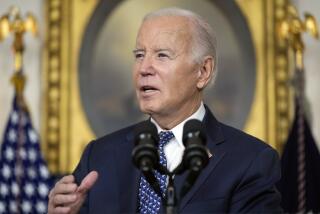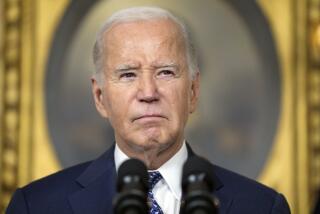NFL head injuries a hot topic in Congress
- Share via
WASHINGTON — Congress on Wednesday waded into the debate over revelations that former NFL players may suffer from memory-related disorders at a much higher rate than the population at large.
In a House Judiciary Committee hearing, representatives heard stories of former football players who had struggled with homelessness, depression and an inability to perform basic tasks after suffering hundreds of blows to the head during their careers. But some present criticized the conclusions drawn from a report highlighting memory-related diseases among the players and emphasized changes the NFL had made to protect players.
“The causes and pervasiveness of these football injuries warrant federal scrutiny,” said committee Chairman John Conyers (D-Mich.), who called for the league to release its injury data for an independent review. “These are not the types of risks these players or their families associate with the game of football.”
A retired-player quality-of-life study commissioned by the NFL found that former players between the ages of 30 and 49 experience memory-related diseases at a rate 19 times higher than men who did not play, according to an analysis of the study by the New York Times.
The study’s authors, however, cautioned against drawing such conclusions, warning that it was not designed to assess whether football players had higher rates of dementia than the population at large.
But for other people studying brain injuries among football players, even without the NFL’s study, the evidence is clear: Players are destroying their brains.
“In layman’s terms, hitting your head thousands of times appears to create a disease that slowly and quietly causes your brain cells to die,” said Chris Nowinski in submitted testimony. Nowinski is the co-director of a Boston University School of Medicine center that studies the type of brain trauma under discussion. He’s also a former college football player who suffered concussions.
Dr. Ann McKee, a neuropathologist who works with Nowinski, testified that all 11 of the former collegiate and professional football players’ brains she had examined showed “severe” signs of degradation. Before they died, many of the players had suffered from memory loss and emotional disturbances.
The witness panels featured NFL Commissioner Roger Goodell as well as the head of the players’ association and several retired players, including New York Giants standout Tiki Barber.
Goodell emphasized that, under his tenure, the NFL had made safety improvements such as changing the rules to ban certain kinds of hits and improving helmet technology.
He also highlighted the “88 Plan,” named for former star John Mackey, who wore number 88 and now lives in an assisted-living facility because he suffers from dementia. Under the plan, the NFL gives up to $88,000 a year to former players who need nursing-home care due to brain injuries.
Goodell’s refusal to acknowledge a direct link between playing football and brain disorders led an incensed Rep. Maxine Waters (D-Calif.) to call for revoking the NFL’s antitrust exemption.
“You’re always studying. You’re always trying. You’re always hopeful. I want to know what’s going on in the negotiations to deal with this problem,” said Waters, whose husband played in the NFL for six years. “I think the responsibility of this Congress is to take a look at your antitrust exemption.”
--
More to Read
Go beyond the scoreboard
Get the latest on L.A.'s teams in the daily Sports Report newsletter.
You may occasionally receive promotional content from the Los Angeles Times.










